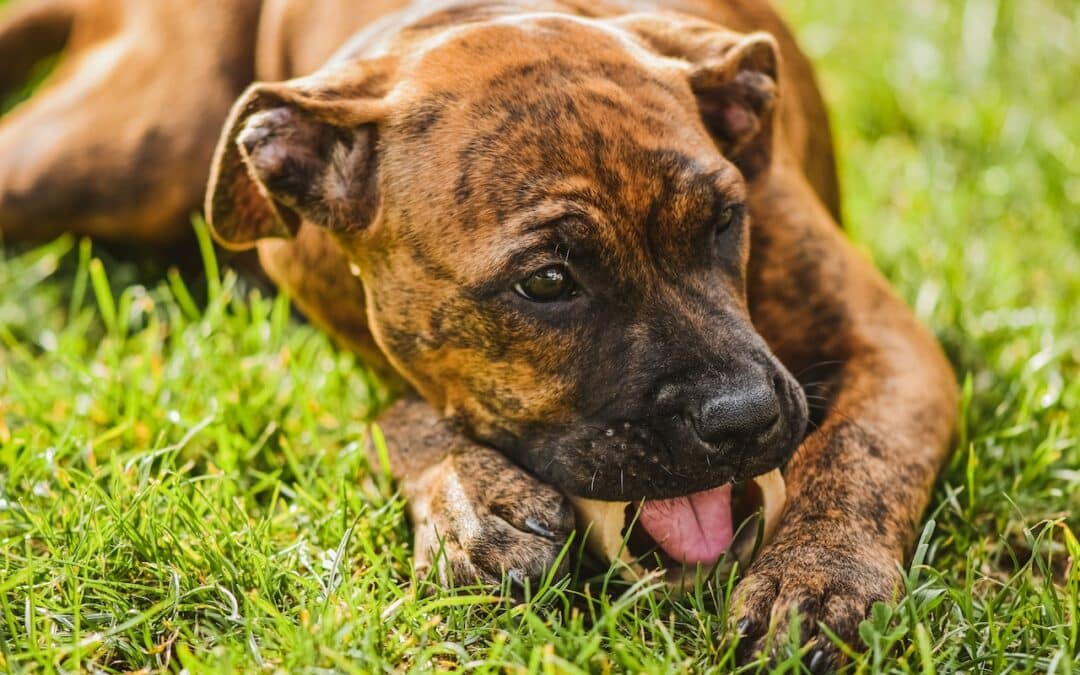Finding safe and exciting toys and treats that will enrich your dog’s daily life can be confusing sometimes. When you’re at the pet store, you will probably see bones of various types, from natural to nylon. However, bones can be incredibly dangerous for dogs. So before you hand one over to your dog for their chewing pleasure, you must understand the risks.
Chewing Is Good for Dogs, But Bones Can Be Dangerous
When a dog chews, their mouth works overtime to create saliva. Excess saliva is a great way to fight tooth decay, because the makeup of saliva, it helps to destroy the bacteria that create plaque.
Safe chew toys can also help reduce destructive chewing behavior, keeping your furniture and shoes a little safer. They can also reduce the risk of your dog getting into something dangerous. Chew toys can even distract a dog that tends to over-lick or chew their paws, or keep them from worrying wounds that are still healing.
Are Raw Bones Safe for Dogs?
Raw bones contain many nutrients and minerals that can be beneficial to dogs. However, along with the nutrients in raw bones comes the risk of bacteria. Keep the bone in the fridge to prevent bacteria, and throw bones away after 3 or 4 days.
As much as dogs love bones, excessive chewing can cause dehydration. To avoid this, only allow your dog to chew for 15-minute intervals. Chewing raw bones can also cause gastrointestinal upset (tummy ache) and even vomiting or diarrhea. If you see any signs of these conditions, raw bones may not be good for your dog.
You must also make sure that raw bones are safe for your dog in particular. Make sure any bone you give your dog is the proper size. Large breed dogs need large size bones. And for small dogs, raw bones should probably be avoided.
Bones can also cause problems like broken teeth, scratched gums, and damaged enamel. Avoid circular-cut bones, because they can get stuck in a dog’s jaws, as well as long, skinny bones that could pose a choking hazard.
Cooked Bones Are Always Dangerous
Giving a dog a cooked bone can cause all sorts of damage! Cooked bones splinter easily when chewed, and the shards can injure the soft tissues of the mouth, the throat, and even the stomach and intestines. Internal injuries like these are difficult to notice right away, and can lead to a number of serious problems later on.
Smaller cooked bones (like chicken or turkey bones) can be swallowed whole by large dogs, leading to intestinal blockages. Internal injuries and intestinal blockages can only be corrected with invasive surgery. However, if these problems go on too long, they could result in numerous health issues or even death.
Bones Can Crack a Dog’s Teeth
If your dog chews on bones, they also run the risk of cracking a tooth. The risk of tooth damage is just as high with raw bones as it is with nylon or rawhide. Dogs can chip or break a tooth from intense chewing, a dense section of bone, or weakness in their teeth.
Damaged teeth are extremely painful, and can lead to loss of appetite, tooth decay, and infections. Always monitor your dog for signs of pain after letting them chew on a toy or a bone.
The Best Veterinary Care in Gilbert, Arizona
Keeping your dog safe is a hard job. But you can make that job a little easier by choosing a highly trained veterinarian to provide the best care possible. At East Valley Animal Hospital, we offer all the latest veterinary technology and practices at our newly renovated facility.
During an annual care appointment, we will answer all of your questions, administer any vaccinations your dog needs, and check for signs of problems before they can get worse. From checkups to emergencies, surgery to rehabilitation, our staff has the knowledge and love needed to help your pet live their best and longest life.
Contact us today to make an appointment.
Images used under creative commons license – commercial use (4/7/23). Photo by Alexas Fotos.

